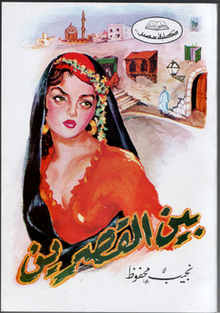Palace Walk
 |
|
| Author | Naguib Mahfouz |
|---|---|
| Original title | بين القصرين (Bayn al-qasrayn), Between the Two Palaces |
| Translator | William M. Hutchins, Olive E. Kenny |
| Country | Egypt |
| Language | Arabic |
| Series | Cairo Trilogy |
| Genre | Novel |
| Publisher | Anchor Press (Eng. trans.) |
|
Publication date
|
1956 |
|
Published in English
|
1990 |
| Media type | Print (Hardback & Paperback) |
| Pages | 512 pp |
| ISBN | (reissue) |
| Preceded by | - |
| Followed by | Palace of Desire |
Palace Walk (Arabic title بين القصرين) is a novel by Egyptian writer Naguib Mahfouz, and the first installment of Mahfouz's Cairo Trilogy. Originally published in 1956 with the title Bayn al-qasrayn (lit. Between the Two Palaces), the book was translated into English in 1990. The setting of the novel is Cairo during and just after World War I.
Palace Walk is the first book of the Cairo Trilogy, set in Cairo, Egypt. It begins in 1917, during World War I, and ends in 1919, the year of the nationalist revolution.
The book's Arabic title translates literally into 'between two palaces' - a phrase which highlights the cultural and political transition Egypt experienced at this time, developments brought into focus by the lives of the el-Gawad family.
al-Sayyid Ahmad Abd al-Jawad is the tyrannical head of his household, demanding total, unquestioning obedience from his wife, Amina, his sons, Yasin, Fahmy and Kamal, and his daughters, Khadija and Aisha. A fearsome and occasionally violent presence at home who insists on strict rules of Muslim piety and sobriety in the house—for example, his wife is hardly ever allowed to leave the house, to maintain the family's good name—al-Sayyid Ahmad permits himself officially forbidden pleasures, particularly music, drinking wine and conducting numerous extramarital affairs with women he meets at his grocery store, or with courtesans who entertain parties of men at their houses with music and dancing. Because of his insistence on his household authority, his wife and children are forbidden from questioning why he stays out late at night or comes home intoxicated.
Yasin, the eldest son, is al-Sayyid Ahmad's only child by his first marriage, to a woman whose subsequent marital affairs are the source of acute embarrassment to father and son. Yasin shares his father's good looks, and, unbeknownst to al-Sayyid Ahmad, Yasin also shares his tastes for music, women and alcohol, and spends as much time and money as he can afford on fine clothes, drink and prostitutes. Fahmy, Amina's elder son, is a serious and intelligent law student, who is heavily involved in the nationalist movement against the British occupation; he also pines for his neighbor, Maryam, but cannot bring himself to take any action. Khadija, the elder daughter, is sharp-tongued, opinionated, and jealous of her sister Aisha, who is considered to be the more beautiful and marriageable. Aisha, meanwhile, is more mellow and conciliatory, and tries to maintain peace. Kamal, the baby of the family, is a bright young boy who frightens his family by befriending the British soldiers who have set up an encampment across the street from the Abd al-Jawad house; he is also very close with his mother and his sisters, and is deeply dismayed when the prospect of marriage for the girls arises.
...
Wikipedia
